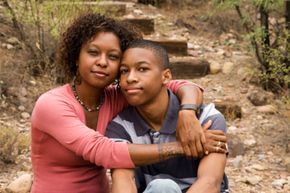 “The thought of coming out can be so daunting that many gay, lesbian, bisexual or transgender young people avoid it.©iStockphoto.com/CREATISTA
“The thought of coming out can be so daunting that many gay, lesbian, bisexual or transgender young people avoid it.©iStockphoto.com/CREATISTA
In the minds of some teens (and some adults), the words "Mom, Dad, I’m gay" can sound a lot like "Mom, Dad, I’m a mass murderer." The thought of coming out can be so daunting that many lesbian, gay, bisexual or transgender (LGBT) young people simply avoid it. That can result in poor school performance, isolation, anxiety, depression, drug use and other self-destructive behavior.
In short, "staying in" is often detrimental to a child’s physical and mental health.
As a parent, you want to establish a safe space for your child to reveal his or her sexual orientation. As a parent, you want to react in exactly the right way.
As a parent, that can be an extremely difficult thing to do.
Some do it right from the start; others need to find their way through mixed feelings to make it to the acceptance and support that any child needs to thrive.
Here, some suggestions that can help you navigate the journey. Your first step when your child comes out to you is perhaps the most important one: Listen to what that child is saying.
Contents
- Listen to (and Hear) the Words
- Respect Your Child
- Learn About It
- Get Involved
- Defend, Support, Love
Listen to (and Hear) the Words
 “Your child has likely practiced these words over and over, so listen to them.©iStockphoto.com/lisafx
“Your child has likely practiced these words over and over, so listen to them.©iStockphoto.com/lisafx
Some people summon the courage to come out to their parents in their 20s, maybe their 30s or 40s. Others never find a way to say the words. If your child is telling you he or she is gay, you can be sure of a few things: Your child has struggled, is frightened and has decided to trust.
He or she has also probably practiced the words over and over, so listen to them. Hear them. Don’t interrupt. Take the words in and think about what your child is telling you before you react, because underneath the ostensible message that your child is gay is the undeniable subtext: I need you to support me in this.
If you can, do that as soon as your child finishes speaking. A hug is a good start. Words of encouragement, such as "That’s perfectly fine by me" or "All I care about is that you’re happy," are good responses, too.
If you find that your mixed feelings make that kind of prompt support difficult (which is natural and fairly common), then do the next best thing: Say "I love you."
And then, begin working toward the level of support your child needs from you …
Respect Your Child
For many parents, the first reaction to hearing "Mom, Dad, I’m gay" can be denial. It’s tempting to dismiss what your child is telling you as "a phase," or "just experimenting," or plain-old teenage confusion.
If that’s what you’re feeling, keep it to yourself. Respect your child enough to treat his or her feelings as valid. After all, it may have taken months or years for him or her to get up the courage to tell you this secret, and that’s plenty of time to reconsider if confusion, experimentation or a phase is the underlying cause.
Validating is the first sign of respect. The next one is letting your child set the pace. Just because your son or daughter comes out to you doesn’t mean you should tell your best friend or write about it in your blog or, however well-intentioned, wear an "I Love My Gay Son" T-shirt to the grocery store. Respect your child’s privacy. Sexual orientation is a personal subject.
It’s also a controversial one, and many parents experience feelings of guilt when they find out their child is gay. That’s where education comes in.
Learn About It
 “If you’re having trouble working your way through your emotions, consider joining a support group for parents of LGBT children.©iStockphoto.com/nicolesy
“If you’re having trouble working your way through your emotions, consider joining a support group for parents of LGBT children.©iStockphoto.com/nicolesy
Certain religious perspectives aside, most experts agree that homosexuality is a case of "nature," not "nurture." Getting educated about LGBT issues can help alleviate unnecessary parental guilt, regret and confusion; eliminate any latent (or not-so-latent) feelings of homophobia; and open the door to the kind of supportive, non-judging relationship every child (and parent) needs, gay or not.
So seek help from experts. That could mean going to the library and reading up on LGBT issues and family stories; joining organizations like PFLAG (Parents, Families and Friends of Lesbians and Gays); finding a counselor or psychologist to help you work through your feelings and find the best ways to help your child and yourself; or joining a support group for parents of LGBT children and adults.
You’re not alone, and finding your own support network can help both you and your child navigate the coming-out terrain.
Part of that navigation might mean taking on an active role in your child’s struggle — if you get permission …
Get Involved
 “If your gay teen wants you to get involved, join him or her at a PRIDE march.Dondi Tawatao/Getty Images
“If your gay teen wants you to get involved, join him or her at a PRIDE march.Dondi Tawatao/Getty Images
Every child is different. Gay or straight, a teen might want to deal with his or her obstacles privately, or with the help of a select few, or with the whole world as a stage.
No matter what, you will be standing beside your gay teen figuratively; whether or not you’re standing beside him or her literally depends entirely on your child.
If your gay teen wants you to get involved in his or her struggle (not just your own), there are a number of ways you can share in it. Join your child at a PRIDE rally, or suggest taking part in a joint parent/child support group, or offer to help him or her set up a LGBT alliance at school. You can also write letters to senators, speak with school officials or contact city council members in support of safety and equality programs supporting LGBT teens in school and beyond.
The one area where you don’t need permission to get involved is in the case you legitimately fear for your child’s safety. If you believe your gay teen is facing a physical threat or is experiencing symptoms of severe depression, it’s time to intervene.
Which brings us to the most important part you’ll play in your child’s coming-out: being the kind of parent you’ve always wanted to be …
Defend, Support, Love
 “Show your child that there is nothing she can do to lose your love.©iStockphoto.com/digitalskillet
“Show your child that there is nothing she can do to lose your love.©iStockphoto.com/digitalskillet
You know the parents you wish you had? The ones who told your soccer coach where to go when he said you belonged on the bench? The ones who said "Go for it!" when you thought it would be fun to wear a plaid shirt with polka-dot pants to kindergarten?
The ones who made it perfectly clear you could do nothing, absolutely nothing, to lose their love?
This is the parent to be when your child comes out to you, and these are the feelings to get across to your tween, teen or fully grown adult: There is nothing wrong with being gay; you are good, normal, worthy and fully deserving of love; and whenever you feel like sharing, I am here with open ears.
It may take some time to get there, and that’s OK. But the sooner, the better. What you’re going through is, most likely, nothing compared to what your child is experiencing.
For more information on parenting, support groups and LGBT issues, look over the links on the next page.
Lots More Information
Related Articles
- One Teen’s Perspective on Dating
- Teen Tips to Overcome Cutting
- Teen Drug Use
Sources
- "Coming out: Being a proud parent of an LGBT child. Parents First for Health." GOSH. (Nov. 26, 2010)http://www.childrenfirst.nhs.uk/families/features/parenting/coming_out.html
- Drawhorn, Omie. "What To Do When Your Child ‘Comes Out.’" ParentDish. (Nov. 26, 2010)http://www.parentdish.com/2010/06/01/what-to-do-when-your-child-comes-out/
- Smith, Patricia. "When Your Child Tells You He’s Gay…" Education.com. (Nov. 26, 2010)http://www.education.com/magazine/article/What_to_Do_Gay_Child/
- "Mom, I’m Gay: What to Do When Your Child Comes Out." Chesapeake Family. (Nov. 26, 2010)http://www.chesapeakefamily.com/Ages-and-Stages/High-School/mom-im-gay-when-your-child-comes-out
- "When Your Child ‘Comes Out.’" Your Social Worker. (Nov. 26, 2010)http://www.yoursocialworker.com/p-articles/coming_out.pdf

